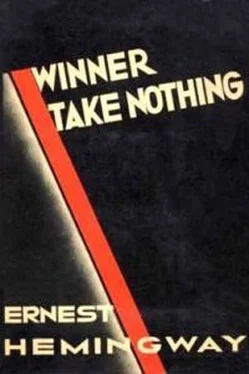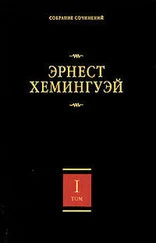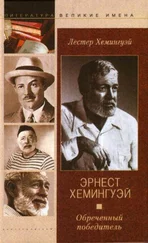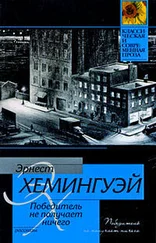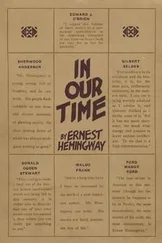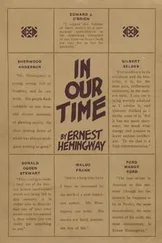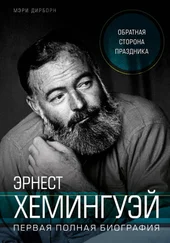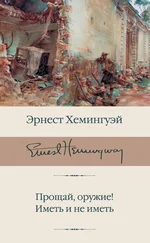“I knew you were tired. ‘My God,’ I said, ‘they’re too tired all right to come,’” Madame Fontan said. “Go get some wine, Fontan.”
“I’ll take you in the car,” I said.
“All right,” Fontan said. “That way we’ll go faster.”
We drove down the road in the motor–car and turned up a side road about a mile away.
“You’ll like that wine,” Fontan said. “It’s come out well. You can drink it for supper tonight.”
We stopped in front of a frame house. Fontan knocked on the door. There was no answer. We went around to the back. The back door was locked too. There were empty tin cans around the back door. We looked in the window. There was nobody inside. The kitchen was dirty and sloppy, but all the doors and windows were tight shut.
“That son of a bitch. Where is she gone out?” Fontan said. He was desperate.
“I know where I can get a key,” he said. “You stay here.” I watched him go down to the next house down the road, knock on the door, talk to the woman who came out, and finally come back. He had a key. We tried it on the front door and the back, but it wouldn’t work.
“That son of a bitch,” Fontan said. “She’s gone away somewhere.”
Looking through the window I could see where the wine was stored. Close to the window you could smell the inside of the house. It smelled sweet and sickish like an Indian house. Suddenly Fontan took a loose board and commenced digging at the earth beside the back door.
“I can get in,” he said. “Son of a bitch, I can get in.”
There was a man in the back yard of the next house doing something to one of the front wheels of an old Ford.
“You better not,” I said. “That man will see you. He’s watching.”
Fontan straightened up. “We’ll try the key once more,” he said. We tried the key and it did not work. It turned half–way in either direction.
“We can’t get in,” I said. “We better go back.”
“I’ll dig up the back,” Fontan offered.
“No, I wouldn’t let you take the chance.”
“I’ll do it.”
“No,” I said. “That man would see. Then they would seize it.”
We went out to the car and drove back to Fontan’s, stopping on the way to leave the key. Fontan did not say anything but swear in English. He was incoherent and crushed. We went in the house.
“That son of a bitch!” he said. “We couldn’t get the wine. My own wine that I made.”
All the happiness went from Madame Fontan’s face. Fontan sat down in a corner with his head in his hands.
“We must go,” I said. “It doesn’t make any difference about the wine. You drink to us when we’re gone.”
“Where did that crazy go?” Madame Fontan asked.
“I don’t know,” Fontan said. “I don’t know where she go. Now you go away without any wine.”
“That’s all right,” I said.
“That’s no good,” Madame Fontan said. She shook her head.
“We have to go,” I said. “Good–by and good luck. Thank you for the fine times.”
Fontan shook his head. He was disgraced. Madame Fontan looked sad.
“Don’t feel bad about the wine,” I said.
“He wanted you to drink his wine,” Madame Fontan said. “You can come back next year?”
“No. Maybe the year after.”
“You see?” Fontan said to her.
“Good–by,” I said. “Don’t think about the wine. Drink some for us when we’re gone.” Fontan shook his head. He did not smile. He knew when he was ruined.
“That son of a bitch,” Fontan said to himself.
“Last night he had three bottles,” Madame Fontan said to comfort him. He shook his head.
“Good–by,” he said.
Madame Fontan had tears in her eyes.
“Good–by,” she said. She felt badly for Fontan.
“Good–by,” we said. We all felt very badly. They stood in the doorway and we got in, and I started the motor. We waved. They stood together sadly on the porch. Fontan looked very old, and Madame Fontan looked sad. She waved to us and Fontan went in the house. We turned up the road.
“They felt so badly. Fontan felt terribly.”
“We ought to have gone last night.”
“Yes, we ought to have.”
We were through the town and out on the smooth road beyond, with the stubble of grain–fields on each side and the mountains off to the right. It looked like Spain, but it was Wyoming.
“I hope they have a lot of good luck.”
“They won’t,” I said, “and Schmidt won’t be President either.”
The cement road stopped. The road was gravelled now and we left the plain and started up between two foot–hills; the road in a curve and commencing to climb. The soil of the hills was red, the sage grew in gray clumps, and as the road rose we could see across the hills and away across the plain of the valley to the mountains. They were farther away now and they looked more like Spain than ever. The road curved and climbed again, and ahead there were some grouse dusting in the road. They flew as we came toward them, their wings beating fast, then sailing in long slants, and lit on the hillside below.
“They are so big and lovely. They’re bigger than European partridges.”
“It’s a fine country for la chasse, Fontan says.”
“And when the chasse is gone?”
“They’ll be dead then.”
“The boy won’t.”
“There’s nothing to prove he won’t be,” I said.
“We ought to have gone last night.”
“Oh, yes,” I said. “We ought to have gone.”
The Gambler, the Nun, and the Radio
They brought them in around midnight and then, all night long, every one along the corridor heard the Russian.
“Where is he shot?” Mr. Frazer asked the night nurse.
“In the thigh, I think.”
“What about the other one?”
“Oh, he’s going to die, I’m afraid.”
“Where is he shot?”
“Twice in the abdomen. They only found one of the bullets.”
They were both beet workers, a Mexican and a Russian, and they were sitting drinking coffee in an all–night restaurant when some one came in the door and started shooting at the Mexican. The Russian crawled under a table and was hit, finally, by a stray shot fired at the Mexican as he lay on the floor with two bullets in his abdomen. That was what the paper said.
The Mexican told the police he had no idea who shot him. He believed it to be an accident.
“An accident that he fired eight shots at you and hit you twice, there?”
“Si, señor,” said the Mexican, who was named Cayetano Ruiz.
“An accident that he hit me at all, the cabron,” he said to the interpreter.
“What does he say?” asked the detective sergeant, looking across the bed at the interpreter.
“He says it was an accident.”
“Tell him to tell the truth, that he is going to die,” the detective said.
“Na,” said Cayetano. “But tell him that I feel very sick and would prefer not to talk so much.”
“He says that he is telling the truth,” the interpreter said. Then, speaking confidently, to the detective, “He don’t know who shot him. They shot him in the back.”
“Yes,” said the detective. “I understand that, but why did the bullets all go in the front?”
“Maybe he is spinning around,” said the interpreter.
“Listen,” said the detective, shaking his finger almost at Cayetano’s nose, which projected, waxen yellow, from his dead–man’s face in which his eyes were alive as a hawk’s. “I don’t give a damn who shot you, but I’ve got to clear this thing up. Don’t you want the man who shot you to be punished? Tell him that,” he said to the interpreter.
“He says to tell who shot you.”
“Mandarlo al carajo,” said Cayetano, who was very tired.
Читать дальше
Конец ознакомительного отрывка
Купить книгу
